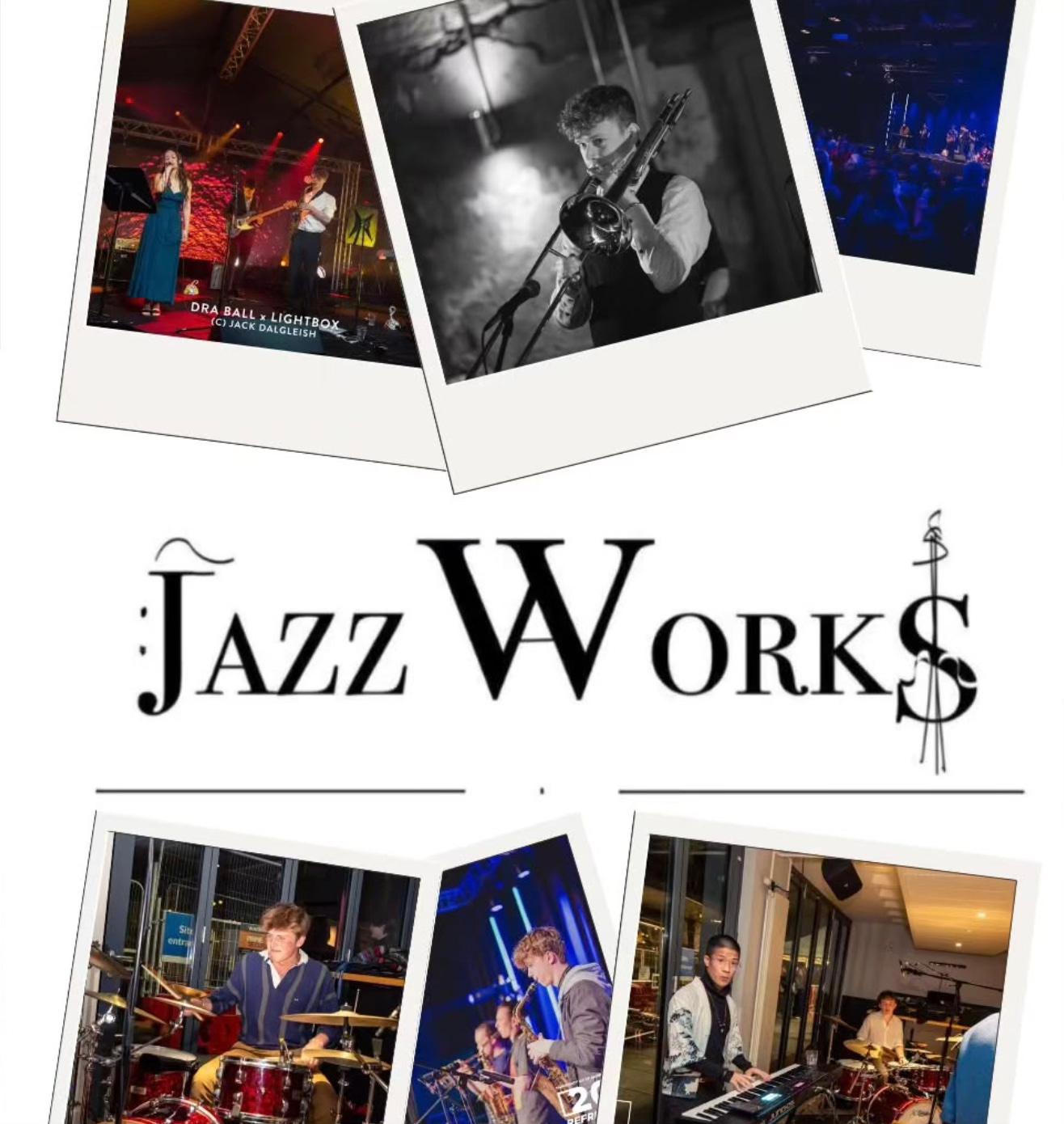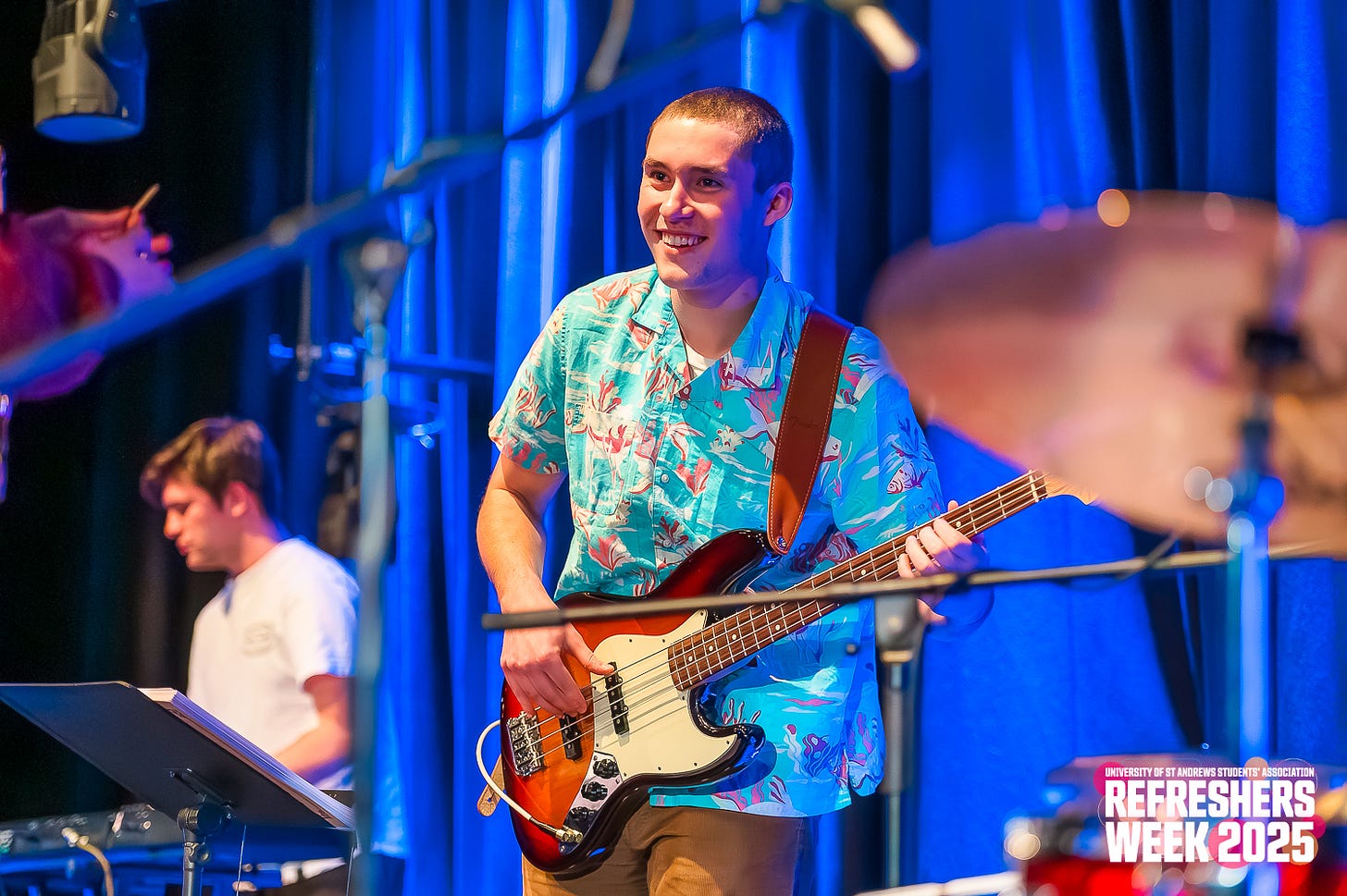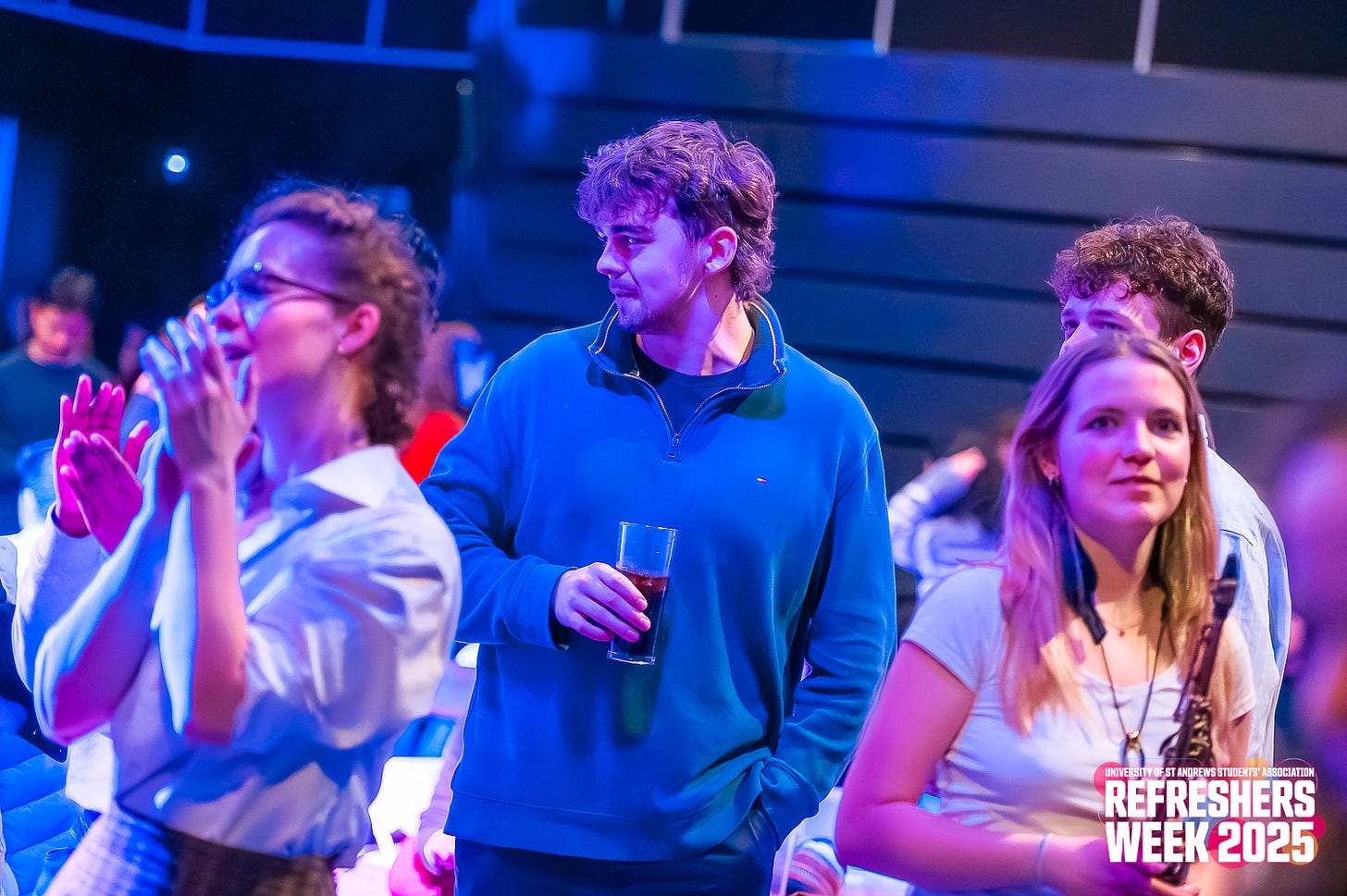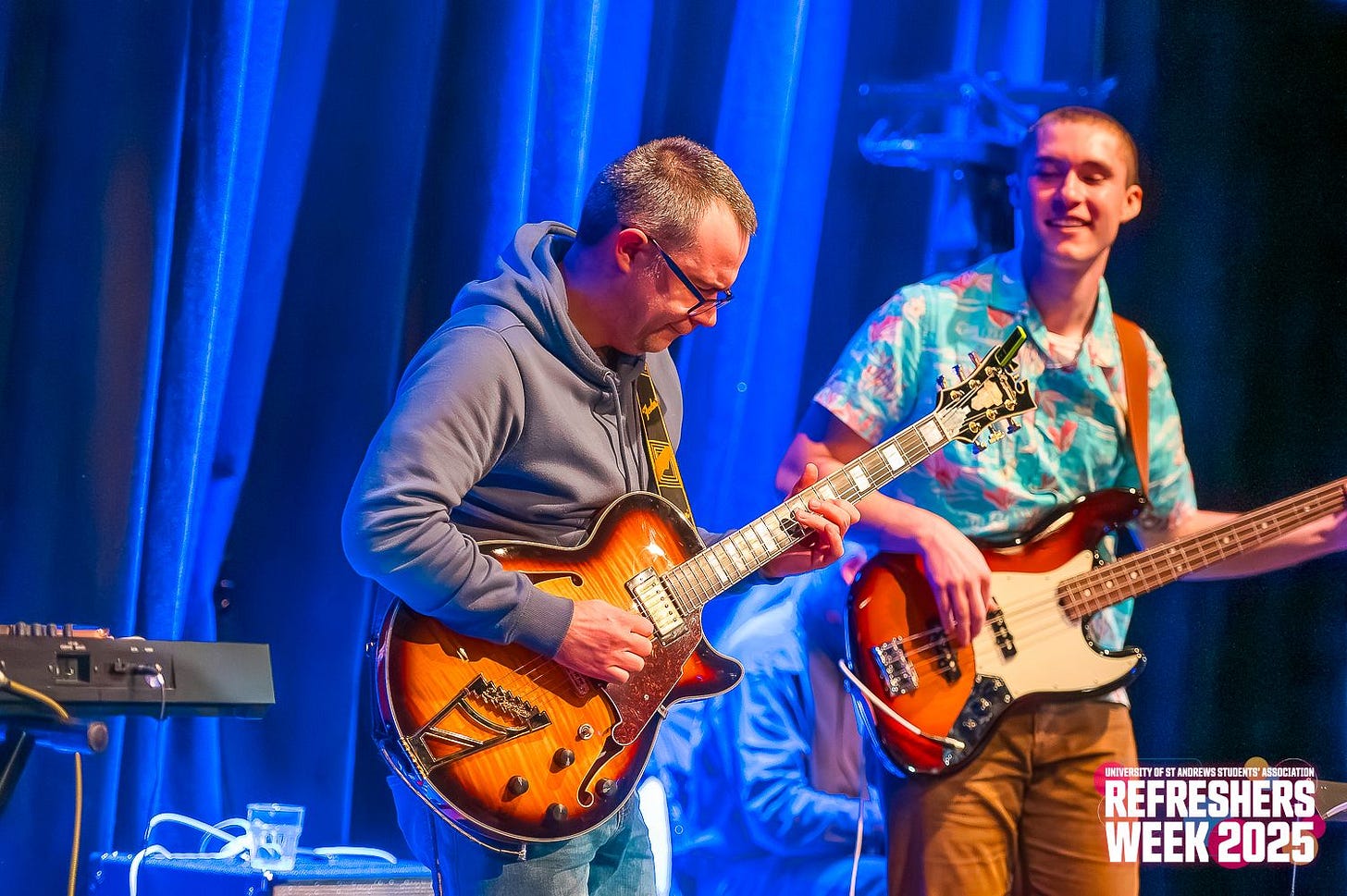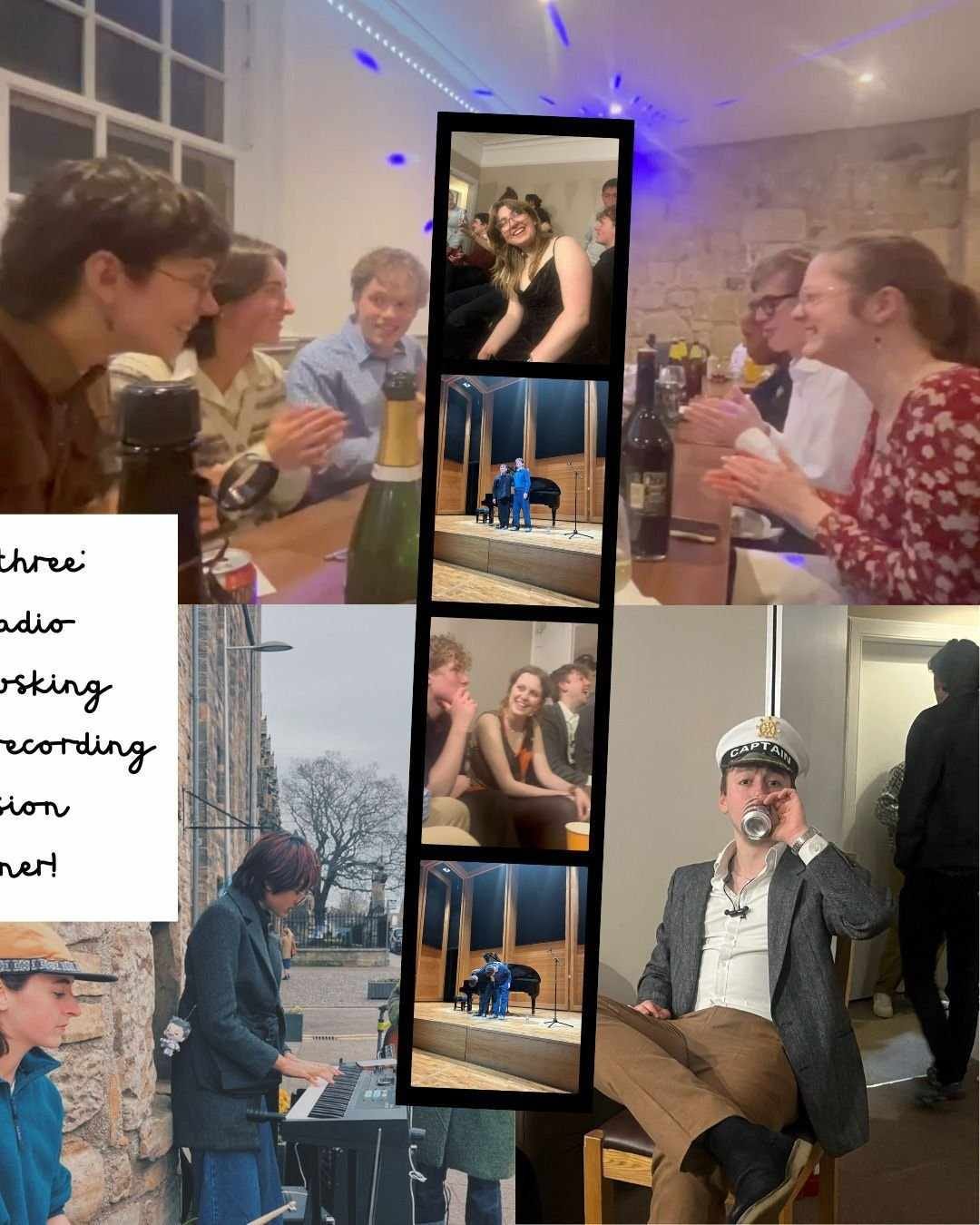Interview with JazzWorks
A conversation with George Davies and Lizzie Kroeze about extracurricular student music and small town community building.
JazzWorks is the student jazz society at the University of St Andrews in Scotland. Its committee organizes weekly ‘Jazz Night’ jam sessions and regular workshops, and the society assembles groups of musicians to perform at local events. JazzWorks was founded over two decades ago but has significantly expanded in recent years, collaborating frequently with other societies and local businesses to reach a broader population of students and townspeople. JazzWorks recently put on the first St Andrews Jazz Festival; a three-day production featuring workshops, jam sessions, street performances, and a concert from pianist Ben Shankland and vocalist Sam Hancock. Below is my conversation from the morning after the end of the festival with JazzWorks committee members George Davies and Lizzie Kroeze.
Eli Thayer: Pretend that I’ve never been to St Andrews before and I don’t understand how there can be a functional jazz scene in a tiny, posh, Scottish coastal town. How does that work?
George Davies: What I always say is that while St Andrews may be small geographically, the music scene will be a function of how big it is socially. And with ten thousand students crammed into one place with not much else to do, people are looking for ways to make connections and fun events to go to. So I think it’s almost easier to have a music scene somewhere that’s geographically small, if a lot of people are together. And we also get quite a few people coming from America, which is useful, as it has a bit more jazz in the education system than there is in the UK. People definitely come here looking for niche, fun things to do; jazz is one of them.
Lizzie Kroeze: I also think because we don’t offer a music degree here, it actually allows a lot more people to get involved. There’s so many more levels of musicians, which is really great.
ET: Why does jazz specifically resonate?
LK: I feel like jazz is the most social in the sense that it’s not prepared things, so people feel like they can just come and play, and give it a go. Especially Jazz Night is just so accessible to all students and it brings such a big crowd in. I’m someone who didn’t do a lot of jazz before coming here, but obviously saxophone is a very ‘jazzy’ instrument naturally so I wanted to give that a go. It was easier and less stressful to be involved in a big group of musicians rather than trying to be in a band, cause that takes more time.
GD: Also from the audience side of things, St Andrews is a place with uni students looking for cool things, cool aesthetics to post on Instagram. You’re going to a new place and are maybe more willing to find a niche and do something different. I think jazz, as opposed to being in a mainstream rock and pop band -- which there are plenty of and which are brilliant -- there are more people willing to try something different and more aesthetic.
ET: What does JazzWorks do? What is your role in facilitating that scene?
GD: JazzWorks is the way that people come together to play jazz. For me, quite a lot of that is about creating events based around a time. I really like how Thursday nights are a thing, and are virtually synonymous with Jazz Night across town. We put that together and create spaces for the jams. Also, which I think is quite important, we provide all the equipment and the facilities, and we run the management of all the kit.
LK: I think workshops are super helpful. That’s what grows the community every year, there’s a new wave of people. As someone who definitely needed workshops, it was so helpful and made me so much more comfortable to get involved. I feel like the jams around town, not just in the Student Union, is good for getting people in the community -- not just students -- involved.
GD: I was the president last year, band manager this year. Lizzie has been the treasurer. We’ve been doing the behind-the-scenes logistics.
ET: Where did the idea for a festival come from, and what did you hope to achieve with it?
GD: It happened at some point this time last year. Jazz Nights were doing really well, the Main Bar was getting really full, and it felt like there was a big demand for people to come hear us play. So I thought it would be good to show people in the community who aren't regular attendees that there is jazz, and to get it out a little further.
LK: This year it’s such a big group of musicians and we’re all relatively close, so it felt easy to organize different events without the stress of people not coming because we knew people would show up. There’s so many jazz festivals in so many cities. St Andrews is small, but it’s still very touristy. It’s a big name, I would say, in terms of Scotland. I think it would be cool for it to continue and grow throughout the next few years.
GD: To your point about there being lots of festivals in Scotland: there are also a lot of other festivals in St Andrews. The film festival, On the Rocks…
LK: Folk and trad.
GD: Exactly. If they can do it, why can’t we?
ET: Now that the festival has wrapped, do you feel that you’ve succeeded in your goals?
LK: Yeah! This was the first time it was running and we were pretty ambitious with the events, and we managed to do it all pretty seamlessly. The hardest thing, for us, is moving gear around. We don’t have a solution to that, to be honest. But all the concerts and jams went super well, and we played in a couple of old folks’ homes which sounded like it also went well. I know a lot of my friends who didn’t really get involved in jazz were excited when they saw people playing on the street or heard the concerts happening. So I think it was successful in the sense that it brought the community together.
GD: What I was most worried about happening on the musicians’ side of things, but what didn’t happen, is that we would overplay them for three days straight and they wouldn’t want to play anymore. But from texting other committee members, hearing a proper concert happen and watching other people play jazz meant that appetite to play was apparently still high, even at the end. Hopefully it made people even more excited about jazz, rather than draining them by running too many events.
ET: What ambitions are there for future editions of the festival?
LK: I reached out to Jazz Scotland, at least to talk to them because they run festivals in Aberdeen and Dundee. They could definitely have some really good input or be able to help us bring different musicians in. I think it would be good to run more events, and based on what happened I think we could do it. Everyone was capable of setting up equipment and taking it down, and comfortable running ticket sales and whatnot. So I think just more music is something we could definitely achieve.
GD: It felt like this time around there was just an explosion of different ideas. Is the focus that we’re bringing musicians in to listen to? Is it that we’re carrying on playing as normal? Is it for charity? So we’ll start to formalize each of those aims a bit more. And it sounded like through Jazz Scotland, bringing more talent to St Andrews would be really cool. Cause that was the most novel part of it, more so than just busking which we can do at any point.
LK: Advertising is so important; I think we learnt that in the three days. We did what we could on Instagram and stuff, but a lot of people in the community don’t follow our Instagram or may not have it at all, which is so fair. So putting up posters or being able to advertise on Jazz Scotland’s website could help and is definitely something to work on.
GD: And to make even more for charity. I think we turned a profit, like a few hundred.
LK: I think we did, four or five hundred pounds.
GD: For a first time round, that’s excellent. More of that.
ET: JazzWorks recently won the St Andrews Students Association Community Engagement Award. Was that a surprise?
LK: It was not surprising, because I think we all really did believe that we deserved it as a society. Jazz does a lot for the community and reaches a large number of people. But it was nice because I thought our interview was going to be very festival-heavy with that as our selling point, but that ended up just being mentioned at the end. We were able to talk about the jams at Club 601, the Byre Theatre, and St Andrews Brewing Company brought people in, and how we people like Dave (a St Andrews local) come and play with us every week. So the society kind of sold itself, which was impressive.
GD: I agree. It wasn’t necessarily a surprise that JazzWorks was capable of achieving this, because I’m a passionate believer that JazzWorks is easily the best society in town. But I do think that what made it happen was that we were really well organized this year. We had a really good committee; everyone was pulling their weight and trying new things. The music will always be there, but getting jazz musicians to organize things is not always the easiest. So we’ve done a really good job at pushing ourselves even more. I felt like we pushed the boundary on what JazzWorks is capable of this year.
ET: How do you see the society’s role in the town and the region?
GD: That’s funny, because the society doesn’t need to exist for there to be jazz and music happening. That would happen naturally, as it does for other genres. What makes us useful is that, as Lizzie was saying, we can bring more people in who might not have the confidence otherwise to get involved in jazz, and we can connect people who wouldn’t have otherwise connected. Rather than being centered around clique-y, individual bands who get together and don’t involve anyone else, it’s much more flexible and fluid when it’s a community of musicians. Not to overdo the community point, but it’s really just about building connections between musicians. That can be great for people’s musical development. You’re not just going to be siloed into one subgenre, because under ‘jazz’ there’s thousands of things. You can constantly get new ideas from different musicians and keep on changing.
LK: Our role as a society is that we organize for everyone. Especially for gigs, people might not be able to reach out and organize for themselves. It’s also nice to get different bands together instead of just sending the same groups every time.
GD: I don’t know what other type of music in St Andrews has you playing with a different band every time. That’s actually really cool. It means you can probably stomach a lot more jazz over the course of a term than you could if you were playing with the same four people. It makes it easier when you’re doing different things. There’s less possibility of drama, too.
ET: Have there been any challenges in realizing that vision?
LK: A challenge with having so many musicians is that everybody wants to play. That’s great, but it is hard sometimes for us to manage player expectations, just making sure they feel like they’re getting enough gigs and are playing with musicians of their level. But this year has been pretty good. We have a gig calendar, which helps us make sure it’s more fair.
GD: Does this come from your experience as jam manager as well?
LK: Oh yeah, my one night as jam manager really changed a lot. Really opened my eyes.
GD: Yeah, I agree. And on the organizing side of things, it’s trying to figure out what the limits of an eight-person committee are, especially eight people who are incredibly busy around town in general. Just seeing how much time people are able to give to a specific thing is always going to be a bit of an experiment. I feel like we definitely got a very committed group of people. So then it’s just about figuring out how to distribute the organizational tasks more equitably so that everything runs as smoothly as possible and people aren’t feeling like it’s too much on top of student work and other extracurriculars.
ET: You mentioned that the advantages include organizing gigs and helping to build confidence. Is JazzWorks helping students to prepare for post graduation life?
LK: As someone who’s about to graduate, JazzWorks has been huge for making me want to continue music afterward. Before being in JazzWorks I never would have had the confidence to go up with a random group of people, call tunes, and figure it out on the spot. It gives people confidence to back themselves and have fun, because at the end of the day it is fun and it’s meant to entertain people. A lot of people watching aren’t jazz musicians; they just enjoy the music that’s happening. So for learning to find a community of musicians and continuing to play, JazzWorks is super helpful. A lot of bands have to disband after graduating, so JazzWorks is nice in that sense.
GD: And in terms of how jazz works, socially, understanding how a jam works and what it is, is totally about confidence. Even now when I go down to London, I’ve only tried to find a jam to go to once or twice. And even that is still terrifying, because the level is higher generally than it is in St Andrews. Had I not had the confidence of playing at these ones and developing skills there, I would absolutely not be confident to go and try in London. The fact that JazzWorks is so open to beginners, it makes a really good bridge. Otherwise, you’d kind of be going from like-
LK: Zero to a hundred.
GD: Yeah. I do think that generally across UK jazz that I know about, I’d love to see more totally beginner friendly jams. We’ll find out more after graduation, how much there is.
ET: It gets hard out there. How does JazzWorks fit into and engage with the town’s wider music apparatus?
GD: I suppose it does two things that I can immediately think of. The first being that it does, as we said, connect musicians. And that doesn’t necessarily have to be in jazz. Often it’s just a way for people -- even if you’re more of a blues or pop musician -- to meet. You’re playing jazz, you get to chatting, and then you can socialize outside of jazz. Playing straight ahead bebop can be useful for forming connections.
I think we’re also useful as… Lizzie was mentioning how gear is quite important. We’re useful as a group that has a lot of really good gear and can, to some extent, provide it to musicians who need it. There was one day where there were two or three gigs at once -- it was Christmas Ball, another ball, and a gig in Crail -- and with the union especially having so many things on, literally every single drum set across town was in use. If you think about it, there’s only really five or six, and we have two. So that’s quite important, if you want to have a lot of different things going on, for us to provide musicians with equipment.
LK: Like George was saying, I think a lot of bands have connected through jazz but don’t really play jazz anymore. We did a Jals (jazz gals) Night, like a women and non-binary night, and we’re still playing in that group. We totally wouldn’t have connected otherwise. It’s cool to see different things pop up.
ET: Aside from the festival, what projects or events are you most proud of?
LK: The BrewCo jams have been really good this year and are definitely adding a different element. But the Jals Night was pretty huge this year. In past years we haven’t totally committed to organizing it really well, and it left some people feeling a bit underrepresented. But this year we had so many musicians come who honestly I hadn’t seen them before that night, and now they’re coming more consistently. It was cool to see people who usually didn’t play feel so confident on stage. That was really exciting for us this year.
GD: It was so many new faces, and even though there were so many new people it was still just as good as it always is. That’s a function of good organization and good people running it. The workshops, I suppose, kind of link to that. Having a new committee member doing that has really helped, because it’s a hard thing to find the time to do it. He’s organized it really well. And we’re using the full range of musicians, so none of us have to commit too many hours. We’ve had them at least every two weeks, if not every week. There haven’t been, like, thousands of people turning up, but it’s been good for the twenty or thirty less confident, new musicians who have turned up pretty regularly. We’re slowly casting the net wider, and eventually it will pay off as we bring more people into the jams.
ET: Any final thoughts?
GD: Just love jazz, man.
LK: Just love jazz, yeah.
GD: It is a really unique way to connect to people. Even with other bands, you wouldn’t really be able to share the music you’re listening to and then be like, “Okay, let’s play.” It’s really cool. I guess the actual way you’re performing when you’re jamming does immediately require quite a lot of communication and connection for it to be any good. So if you turn up and it’s a band of people you’ve never met, I feel like after an hour of jamming with them that I’d have got to know them quite well.
LK: We’re both involved in sport and different other societies, and jazz is just so unique in how it runs. Like George is saying, connecting with people on stage in that one minute is a cool space to be in.
GD: Compared to sports, where I think there’s more of a pressure to perform, we’re always doing this for fun. It’s never going to be good if you’re feeling pressured. I can do this for years, whereas with some other stuff being on committee is just too much.
ET: What are your favorite standards to play?
LK: Recently I’ve been liking ‘Blues for Alice’. I’ve been doing a lot of that. It’s hard to pick one!
GD: It’s hard to pick one… I am gonna go with ‘On Green Dolphin Street’. At the moment I’m having a massive kick for tunes that switch between swing and latin. Something about where it’s really open, and then *snaps* and it’s really tight. There are more than you think, as well.
Keep up to date with JazzWorks on Instagram and Facebook. Jam sessions take place every Thursday night during term time at the St Andrews Students’ Association, and occasionally at the Byre Theatre and other venues.


